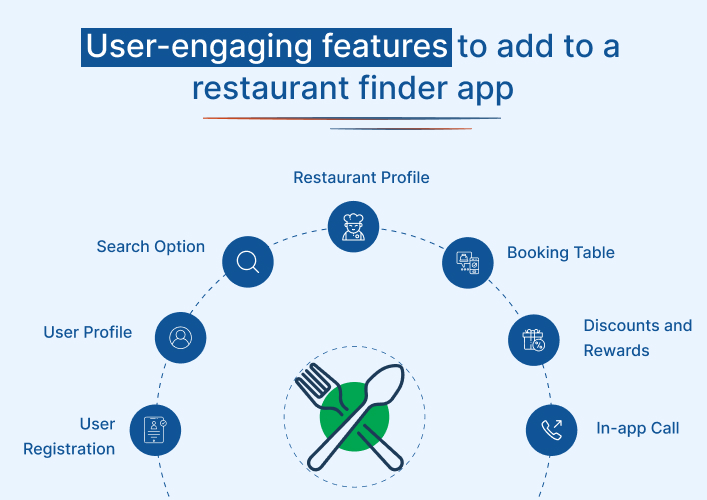What are the user-engaging features to add to a restaurant finder app?

There are some necessary features to add to a restaurant finder app and some are the user-engaging features that boost the UX of the app. Below listed are all the important features that you can add to your app. The features will play an important role in the cost of developing the food delivery or restaurant finder app.
User Registration
Like Uber Eats, you may streamline the registration process by linking the app with social network accounts. This will benefit you in a number of ways, including reducing user effort, helping users find and connect with other foodies who share their interests, and allowing you to integrate information from other social networks in order to tailor recommendations to individual users.
In addition, our experts recommend including a “Sign Up Later” option so that users aren’t all forced to leave the app at once. They like to learn about the app as a whole before deciding.
User Profile
Each registered user should be able to access a personalized profile with information about their dining experiences, favorite restaurants and meals, ratings and reviews submitted by other users, communication with friends, and access to updated discounts and saved coupons. Your restaurant app development partner may also include game elements to add fun and engage more users.
Search Option
A restaurant finder app’s search filter must be hierarchical, categorized, and well-organized. A consumer may do a search on a variety of factors, including proximity, availability, pricing, rating, specialty cuisine, and more. When designing a restaurant-locating app, programmers can draw inspiration from a wide variety of sources.
A huge quantity of restaurants’ information would be stored in your database. You can’t expect consumers to check over each restaurant’s profile to locate the best one to indulge in fine dining at. Therefore, you must adhere to a search and sort criterion.
Thus, including location-based recommendations and searches in the app should be a top priority throughout the creation of a restaurant discovery app.
Restaurant Profile
A restaurant’s profile should have essential information about the establishment, such as the location, hours of operation, rating, types of food offered, images, average cost, scanned menus, an interactive map, and a contact button inside the app.
The app should allow eateries to upload scanned versions of their menus to a public view profile on the app. To make it more engaging, you can allow restaurants to add an interactive menu. Though it’s more expensive and time-consuming to implement, this method is recommended by several of the industry’s leading app designers for restaurants. An online menu of this kind has clickable categories and images of available dishes. In addition, customers may choose any dish and see all the data associated with it.
Booking Table
A restaurant’s app development team has two options when it comes to handling reservations for tables. The first one is for consumers to choose the time, date, and number of guests, while the second one is for the restaurant to select the seating arrangement. The second, more original option is to provide the user complete control over which table best suits his needs.
Discounts and Rewards
Special discounts and promotions tailored to each user’s habits attract new clients and keep loyal ones coming back for more. A rewards system may also be the most innovative method of advertising your business. This approach may entice customers to make more frequent use of your app, get more benefits from it, and help you achieve a larger return on investment.
In-app Call
Convenience features are what set a restaurant finder app apart from the rest of the competition. The option to make phone calls from inside the app is one such function. One way to improve the user experience is to streamline the process of reserving a table at a restaurant.
Furthermore, user feedback in the form of reviews and star ratings is essential to the success of any restaurant-locating app. Not only can positive evaluations encourage new customers to try a restaurant, but they also keep existing customers coming back for longer periods of time. In addition to this, you should use the most engaging UI/UX tactics when designing your mobile app and include a push notifications feature.
Conclusion
It’s not enough for a restaurant finder app to just help you discover a place to eat; it should also help you make the most of your dining experience, whether you’re a foodie, a tourist, or just in the mood for a fast snack. These applications give you the ability to explore new cuisines, rediscover old favorites, and tailor your eating experiences to your every whim and fancy. Thus, to develop a successful restaurant finder app, you need to hire expert app developers who previously have experience in developing such apps.
FAQs
Are restaurant finder apps free to use?
Can I trust the restaurant reviews and ratings on these apps?
How can I ensure that my restaurant finder app is user-friendly and intuitive?
What should I look for in a developer's portfolio?
A developer’s portfolio should showcase their experience with relevant technologies, the diversity of their projects, and the quality of their work. Look for projects that demonstrate their ability to create user-friendly, feature-rich apps.
How can I find the right developers for my restaurant finder app?
Finding the right developers involves networking, using platforms like LinkedIn and GitHub, and leveraging job posting sites. You can also consider outsourcing, hiring a development agency, or seeking referrals from your professional network.
Ravi Bhojani is the Chief Marketing Officer (CMO) at Alian Software, where he spearheads the company’s marketing strategies and drives its brand presence in the competitive IT services landscape. With over a decade of experience in the technology and marketing sectors, Ravi has consistently demonstrated his ability to blend innovative marketing techniques with deep industry knowledge to deliver outstanding results.